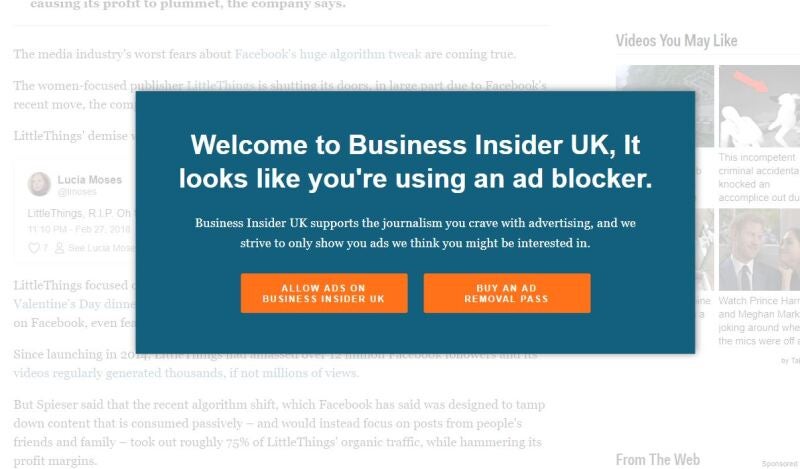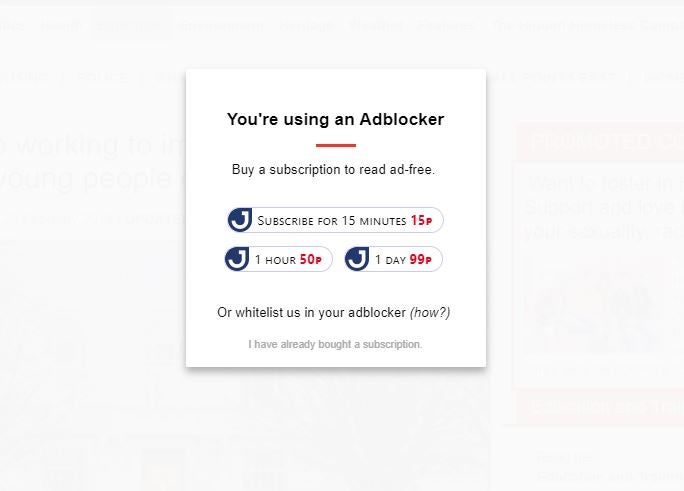
Paywalls have been going up across a number of news websites of late as publishers look to create a stable digital income separate from online advertising, where Facebook and Google are claiming the lion’s share.
On the other hand, news publishers who rely on digital display ads are fighting back against ad-blockers with micro-paywalls as they fight to retain advertisers and so keep their websites free and open to readers.
US news agency Bloomberg has become the latest major publication to charge readers to read its content online, expanding a metered paywall on Businessweek across all of Bloomberg.com.
This means ten free articles a month for readers, as well as 30 minutes of the Bloomberg TV livestream, before they are prompted to become a subscriber from $34.99 (£25.80) a month.
Bloomberg editor-in-chief John Micklethwait said the reason for the transition to a paid subscription model was “partly negative”.
He wrote in an editorial comment: “No news provider has maintained much of a profit out of advertising, no matter how big its audience. But there’s also a positive reason: Consumers will pay. Back in 2006 they were used to the web being free—with just a few outliers (including the Economist).
“But in the age of Netflix and Spotify, people are coming around to paying for content again. They live in a knowledge economy where ideas and information matter and where news is still relatively cheap: You can buy most of the products listed above for the price of a cappuccino a week.”
Total advertising spend in the UK grew by 4.6 per cent to a record £22.2bn last year, but the journalism industry is getting a diminishing slice of the pie. Google is taking by far the biggest amount, followed by Facebook.
The Advertising Association has reported that total internet advertising grew to £11.5bn in the UK in 2017.
Of this, search advertising makes up £8.4bn and display advertising comprises £3.95bn, according to additional figures from the Internet Advertising Bureau.
As Google takes 90 per cent of the UK search advertising total it can be reckoned to be making at least £5bn on this alone in the UK.
Facebook is thought to be the biggest player when it comes to online display advertising in the UK, taking in excess of £1bn.
It’s against this backdrop that newsbrands are struggling to generate a substantial income from online advertising. This is also set against falling newsstand sales and print ad revenues.
A year ago Press Gazette launched its Duopoly campaign warning that the dominance of Google and Facebook in the advertising market was pushing news publishers out of business, a trend which is continuing.
Bloomberg’s decision to go behind a paywall this month follows a similar move by celebrity and lifestyle magazine Vanity Fair in April.
The title, owned by magazine publishing giant Conde Nast, now gives readers four free articles a month before they are told to pay up for more.
US editor Radhika Jones told readers their “commitment will enable us to invest in our reporting, writing, photography and video, expanding into new areas and onto new platforms”.
At the start of the year, technology magazine Wired also started charging for online content. This year marks the 25th anniversary of the title’s launch under founding editor Louis Rossetto.
Wired is charging $10 (£7.40) a year for print and digital access.
In a post explaining the decision, Wired said: “For most of our history our business model, primarily built on advertising, rewarded that depth. Advertisers are eager to connect with our sophisticated audience, and Wired remains the best way to reach them.
“But in recent years, that industry has proven fickle and tumultuous, and a too-slender reed upon which to hang our entire business.”
It added: “For a quarter-century, Wired has watched as the internet has rewritten everything about journalism and media—who creates it, what we expect from it, and how we support it.
“And yet, at heart, Louis’s central observation in our launch issue is as true today as it was 25 years ago—when mere information is cheap and plentiful, context and meaning are more valuable than ever.
“The paywall refocuses our business around that simple truth.”
Out of the 11 major commercial UK national newspaper brands, only three use a paid subscription model: the Times, Telegraph and Financial Times.
The majority are free to access, and rely on a combination of advertising (display and sponsored content), e-commerce – and, in the Guardian’s case, donations – to generate income and support their journalism.
But paywalls are also appearing in a bid to combat the rise of ad-blocking software and so protect revenue generated by display ads on news websites.
In November last year, financial news website Business Insider launched a paywall that asked readers using ad-blocking software to pay to remove adverts or whitelist the website (and so see ads) in order to access content.
As in many cases, the reader is faced with a frozen, whitened screen and the option to “allow ads” or buy an “ad removal pass”.
Clicking the latter takes readers through to Google’s Contributor pass, a type of electronic wallet that they can top-up as they go.
An ad-free page on Business Insider costs £o.o4 while £1 buys access to 25 pages without ads. A “small portion” of this goes to Google for running the Contributor service and the rest to the news website, Google claims.
Business newsbrand City AM now forces ad-block users to either whitelist the website or pay a small fee for access – up to 50p a day in the case of City AM – after installing software from Jamatto.

A micro-paywall has also been employed by gossip website Popbitch. Readers pay 10p for select articles which then caps at 30p for the week. Once they reach the cap, they have full access to the website for the week.
When it launched the paywall in January, Popbitch said: “After decades of trying to make digital pay, the media industry still doesn’t really seem to know what it’s doing about online. So we’re going to try something new.”
There have also been moves in the local and regional press to prevent ad-blocking by using a free registration model.
This month the Yorkshire Post – owned by regional publisher Johnston Press – asked readers to register in order to continue reading its content online.
Letter from the editor: The Yorkshire Post's award-winning website is changing, and we need your support to make it even better. #ProtectingQualityJournalism pic.twitter.com/ZbqFoS6ge6
— James Mitchinson (@JayMitchinson) May 2, 2018
The upshot for readers being an improved website experience, and for the paper the ability to strengthen the relationship between its advertisers and their potential customers by deterring ad-blocking.
In a letter to readers, editor James Mitchinson said: “The high-quality journalism produced by the historic organ since 1974 costs money.
“To ensure The Yorkshire Post can continue to protect and enhance God’s Own County for another 264 years, we need our readers to subscribe to and/or buy our newspaper, and/or subscribe to our digital tablet newspaper, and/or welcome our valued advertisers into your home, online and on mobile.”
Archant’s Hackney Gazette has also put up a micro-paywall to encourage ad-blocking readers to whitelist its website or pay up to 99p for a day’s ad-free online access.

Archant chief content officer and The New European editor, Matt Kelly, told Press Gazette: “At some point you have got to put your foot on the brake and say this is high quality content, it’s expensive and it’s good for your community – you should really feel like making a contribution even if that’s not switching off the adverts that we rely on for our business model.”
He said the publishing group, which has a number of local titles including the Easter Daily Press in Norfolk, is still “open-minded” as to a strategy to make online news pay.
The success of the paywall ad-block deterrent does depend somewhat on websites ensuring their display ads are not so obtrusive to the reader – the very reason many use ad-blocking software – that they are forced to abandon the website altogether.
Kelly added: “The ad industry has been so poor in creating good engaging ad experiences, but there’s no reason why advertising shouldn’t be a really engaging form of content as well.”
Picture: Pixabay
Email pged@pressgazette.co.uk to point out mistakes, provide story tips or send in a letter for publication on our "Letters Page" blog

